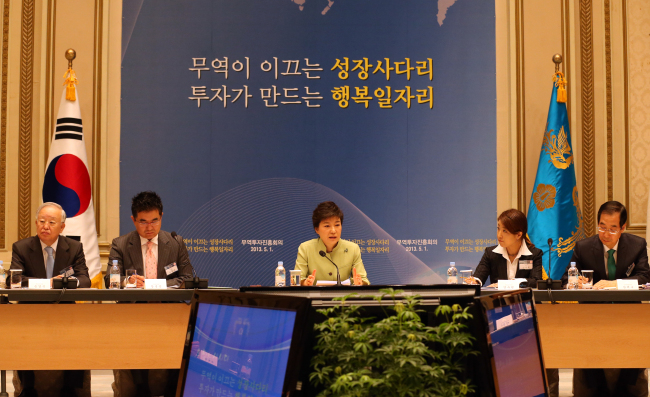정부가 규제에 막힌 10여개 기업의 투자프로젝트 6건의 애로사항을 풀어 12조원의 투자를 유도하고 병원내 의료관광객용 숙박시설 인 메디텔을 호텔업으로 인정키로 했다.
이에 따라 산업공단 내 부지 부족으로 공장 확보에 어려움을 겪어온 에쓰오일의 2조원대 공장신설과 공정거래법에 묶였던 SK종합화학의 1조원대 합작공장 투자건이 빛을 보게 됐다. 강동경희대병원은 우리나라 1호 메디텔을 세우게 된다.
중소기업의 가업상속 공제요건을 완화해 사주들이 안심하고 기업을 상속할 수 있도록 하는 방안도 연내 마련한다.
무역확대 차원에서는 엔저 대응을 위한 환변동보험 확대 등 수출 중소•중견기 업에 11조1천억원의 무역금융을 추가 지원할 예정이다.
현오석 부총리 겸 기획재정부장관과 윤상직 산업통상자원부 장관은 1일 박근혜 대통령 주재로 열린 새 정부 첫 무역투자진흥회의에서 이런 내용의 ‘규제개선 중심의 투자활성화 대책’, ‘수출 중소•중견기업 지원확대 방안’을 차례로 보고했다.
현 부총리는 “기업의 투자부진 지속으로 경기회복이 지연되고 성장잠재력이 훼손될 우려가 있다”며 “불합리한 규제로 기업의 투자에 지장이 초래되지 않도록 하기 위해 이번 대책을 마련했다”고 설명했다.
투자활성화를 위한 방안으로 각종 규제, 지자체의 인허가 지연 등으로 현장에 서 대기중인 대규모 기업 프로젝트 6건 지원, 입지규제 및 업종별 진입규제 개선, 소기업 대상 금융•재정 등 투자인센티브 등이 제시됐다.
우선 지방에 있는 국가산업단지내 땅이 없어 투자가 멈춰진 사례를 해소하기 위 해 저장시설 등 공공기관 운영시설을 지하화함으로써 여유 부지를 확보해 1단계 3조원, 2단계 5조원 등 2016년까지 총 8조원의 투자를 유도하기로 했다.
가장 먼저 에쓰오일의 신규 공장설립이 가능해졌다. 지역은 현재 온산공장 인근 이 될 것으로 보인다
공동출자법인에 한해 손자회사의 증손회사 보유지분율을 100%에서 50% 이상으로 완화하되 외국인 합작법인의 규제를 우선 풀기로 했다. 이에 따라 SK종합화학이 일본 JX에너지와 추진하는 1조원 규모의 파라자일렌(PX) 합작공장 투자 사업이 진척을 볼 것으로 예상된다.
또 외국인투자법인이 부지만 임대해 공장을 지을 수 있게 허용함으로써 1조원, 산업단지내 열병합발전소의 입주 허용으로 1조원 등의 투자가 가능하도록 했다.
정은보 기재부 차관보는 “이들 프로젝트가 계획대로 성사되면 총 투자 효과는 직접투자 12조원에 연관 투자까지 더해져 훨씬 클 것”으로 기대했다.
수도권 규제완화는 이번 대책에 빠졌다. 정 차관보는 “수도권 규제완화 방안도 검토했으나 사회적 합의가 필요하다고 결론을 내렸다”고 설명했다.
대신 호텔업종에 의료관광객용 숙박시설(메디텔)을 추가해 서울 도심의 대형 병 원내 의료관광객용 숙박시설이 지어질 수 있는 근거를 만들었다.
중소기업을 위해 설비투자펀드를 3조원에서 5조원으로 확대하고 신설중소기업의 투자세액공제 이월공제기간 7년으로 연장, 가업상속 공제요건 완화 등도 마련된다.
<관련 영문 기사>
Government unveils measures to boost investment
By Park Hyong-ki
The government unveiled Wednesday a set of deregulatory measures aimed at boosting corporate and foreign investment to offset weak facility investment and construction activities as part of its efforts to overcome low domestic growth and boost business confidence.
The Ministry of Finance said Wednesday that it will move to cut red tape and make its regulatory systems efficient so that domestic and foreign-invested companies can speed up their investment projects in the country. Such deregulatory measures are expected for Korea to gain some 12 trillion won ($10.9 billion) in investments, a Finance Ministry official noted.
While presiding over an investment and export-related meeting, President Park Geun-hye emphasized the need to root out unnecessary regulations that are hindering businesses and investments at this time of low growth for the development of a “creative economy.”
She urged government officials to go out to the field and listen to what both domestic and foreign investors want instead of sitting behind their desk reviewing only regulatory and policy data.
“We must eliminate regulations that block (business and technology) convergence to boost the development of a creative economy,” the president said.
“We have entered an era where there are limits for companies to expand in their traditional markets. Thus, deregulation is inevitable for growth in exports and jobs,” she added.
To this end, the government will move to relax regulatory measures and speed up the business license procedures for companies and investors’ projects.
It will also help them, including joint venture firms with foreign investors, easily tap and access land sites in regional industrial zones where they can establish plants.
Antitrust regulations governing equity ties between subsidiaries of group holding companies and other units will be removed, paving the way for subsidiaries’ subsidiaries -- the so-called “great-grandson companies” -- to form joint ventures with foreign business partners with high-tech assets.
Under the current fair trade law, subsidiaries of holding companies are required to wholly own, or hold a 100 percent stake in, their subsidiaries, or great-grandson units of holding companies.
The government will move to lower the equity ownership cap from 100 percent to 50 percent so that those companies removed from restrictions can attract foreign investors and operate a joint venture partnership, the Finance Ministry said.
This may, for instance, push SK Global Chemical, wholly owned by SK Innovation of SK Group, to establish joint venture operations with Japan-based JX Nippon Oil & Energy in para-xylene chemical.
Korean hospitals will soon be allowed to build their own set of hotels exclusively for foreign patients in line with efforts to boost medical tourism.
Foreign investors from the U.S. and Europe will also be allowed to indirectly invest, for instance through funds, in communication carriers for a 100 percent stake, from currently up to 49 percent. Dominant players such as SK Telecom and KT will remain restricted from foreign investors holding more than a 49 percent stake.
President Park furthermore urged her policymakers to increase support funding Korea’s small and medium enterprises for facility upgrades from 3 trillion won to 5 trillion won, while considering softening inheritance tax regulations on SMEs.
SMEs will also benefit from the government’s 11 trillion won fund to support their export financing as a means to counter foreign exchange volatility amid a weakening yen.
(
hkp@heraldcorp.com)








